Sales enablement software gives sales teams a single place to access everything they need to sell smarter: training, coaching, sales content, analytics, and pipeline tools. By centralizing these resources, reps spend less time searching for materials and more time closing deals.
In this guide, we’ll explain what sales enablement software is, why it matters, and how AI is reshaping the category. We’ll also compare 6 leading platforms, share benefits and key features to look for, and show why monday CRM stands out as a user-friendly solution for sales enablement in 2025.
Try monday CRMWhat is sales enablement software?
Sales enablement software is a platform designed to equip sales teams with the tools, content, and coaching they need to sell more effectively. It combines elements of content management systems (CMS), customer relationship management (CRM), and learning management systems (LMS) in a centralized hub.
The concept of sales enablement has evolved over the last decade. Early solutions focused mainly on storing sales decks and case studies. Over time, platforms expanded to include onboarding tools, conversation intelligence, and analytics dashboards.
Today, AI is reshaping sales enablement again by offering predictive recommendations, automated workflows, and real-time coaching insights that help reps adapt quickly and perform at a higher level.
Sales enablement software is now a strategic partner, not just a library of resources. By combining centralized content with AI-driven insights, these platforms help teams shorten sales cycles, improve win rates, and align more closely with marketing.
Sales enablement vs. sales engagement: What’s the difference?
Although sales enablement and sales engagement sound similar, they tackle different parts of the sales journey.
- Sales enablement is all about making sure your team is armed with the right tools and training to sell more effectively.
- Sales engagement focuses on how your reps actually interact with prospects throughout the sales cycle by managing touch-points, automating follow-ups, and orchestrating multi-channel outreach strategies.
Most successful sales teams need both working together to consistently close more deals.
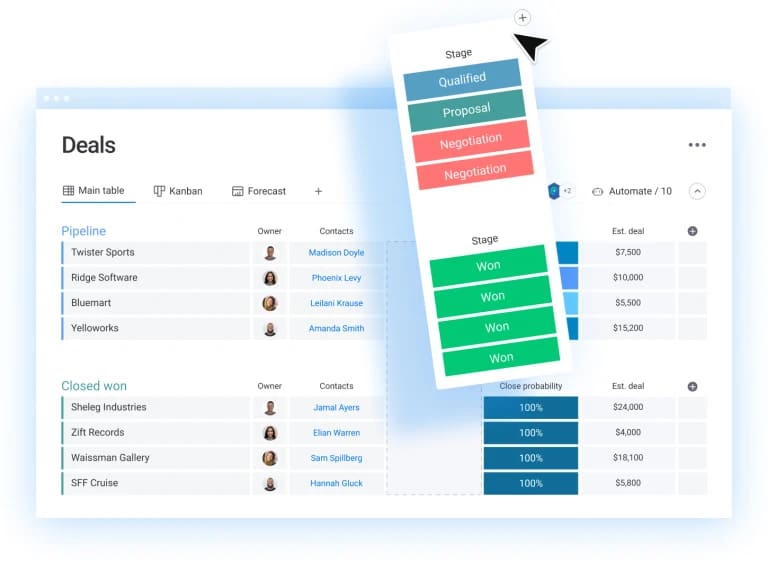
Essential features to look for in sales enablement software
Sales enablement involves a lot of moving parts, and when there are a lot of different components, it’s easy to get overwhelmed when shopping for new software. Not to worry, we’ve zeroed in on the top features you should look for in a sales enablement tool. When considering your options, it’s a good idea to look for these features first before considering other, more niche capabilities.
Content management and centralization
From guides, walkthroughs, onboarding materials, sales decks, and templates for contracts and emails, sales teams have a lot of content to juggle, so the sales enablement solution they use should keep everything centralized and easy to access.
AI-powered assistants and workflow automation
AI is no longer a bonus feature when it comes to sales enablement, but a critical component. Look for a platform that uses AI assistants to offer suggestions and next steps on deal progress in real-time, along with AI-powered workflow automation to take care of manual, repetitive tasks.
Training, coaching, and onboarding capabilities
Look for a solution that makes it easy to send and receive feedback and coaching with real-time updates and shareable reports. Additionally, these systems should facilitate creating and accessing training and onboarding modules and guides for new employees or upskilling your sales team.
Conversation insights
Sales managers need to be able to get quick access to conversation data between sales reps and leads to pinpoint specific areas for coaching. AI is also helpful in this avenue, as it can highlight coaching opportunities by analyzing keywords in specific call logs and emails.
Data analytics dashboards and forecasting
Sales reps need to be able to access dashboards and sales forecasts to see their real-time performance and pipeline progress. This data can help them make smarter decisions and understand where to focus their energy so that they can reach sales quotas.
Work tool integrations
Your sales team likely already uses several sales tools, so make sure the sales enablement solution you opt for can easily integrate them, whether it’s a CRM system, conversation intelligence tools, email platforms, or something else.
How sales enablement software can benefit your business
Sales enablement software isn’t just another platform for your sales team. It acts as the foundation for building strategies that win deals and help agents of all levels and skill sets build the confidence they need to reach their sales goals.
Here’s a look at some of the core ways sales enablement solutions benefit businesses and sales teams:
- Enhances productivity and efficiency: Sales reps don’t need to spend tons of time tracking down important documents or guides, and they can access the content they need to support sales workflows in an instant, leading them to close more deals.
- Improves sales and marketing alignment: Sales and marketing teams can collaborate more efficiently by highlighting specific content that resonates and what’s not landing, helping marketing teams create more compelling content.
- Boosts win rates and shortens sales cycles: When your entire sales team has access to content backed by data, which is proven to work, you’ll likely find that sales cycle lengths will get shorter and your team will start to convert more prospects.
- Speeds up onboarding and ongoing training: Make sure new reps get all their bases covered without overwhelming them with too much information at once. Likewise, your sales team can access ongoing personalized learning that targets specific skills they may be lacking.
- Reveals data-driven coaching opportunities: When managers can clearly access sales rep data, including performance reports, agent behavior, and conversation intelligence data, they can tailor coaching plans to individual needs for more precise training.
The role of AI in sales enablement
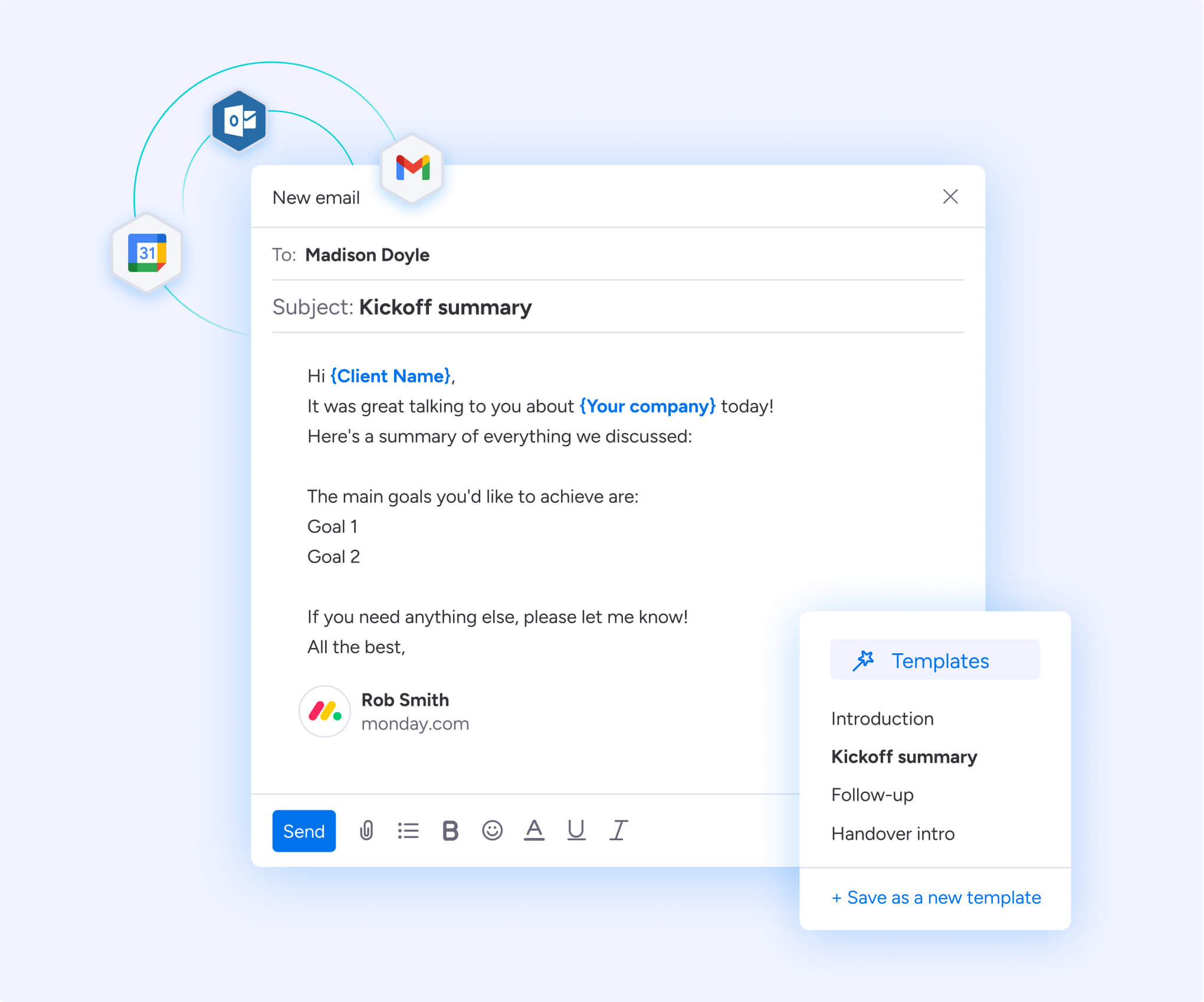
Artificial intelligence is becoming an inseparable part of sales enablement strategies. Instead of simply storing content and training materials, platforms can use AI to analyze data, automate tasks, and provide real-time guidance that helps sales teams sell smarter.
Here are some of the biggest ways AI is transforming sales enablement software:
- AI-powered insights and analytics: By analyzing sales history and buyer behavior, AI sales forecasting software highlights which strategies work best for specific segments and predicts deal outcomes with greater accuracy.
- AI-driven content recommendations: Reps no longer have to guess which case study, deck, or email template to use. AI suggests the most effective content based on past performance and prospect behavior.
- Workflow automation: From follow-up reminders to updating CRM records, AI-powered automations handle repetitive tasks, freeing reps to focus on building relationships and closing deals.
- Conversation intelligence and coaching: AI tools analyze calls and emails in real time, surfacing in-the-moment prompts and identifying areas for improvement. Managers can then use these insights to deliver targeted coaching and training.
With AI, sales enablement moves beyond being a static repository and becomes a dynamic, always-learning system that accelerates productivity and boosts win rates.
Key players in the sales enablement market: 6 top software options
The sales enablement software market is highly competitive, with vendors ranging from all-in-one CRMs to specialized enablement platforms. Analysts like Gartner and G2 regularly evaluate these tools, highlighting leaders and helping businesses benchmark vendors based on customer satisfaction, product capabilities, and market presence.
Here are 6 of the top-rated platforms side-by-side so you can see how they stack up on pricing, features, and AI capabilities:
| Use case | Pricing | G2 rating | |
|---|---|---|---|
| monday CRM | AI-powered content creation and centralization | $12/seat/month | 4.6/5 (G2) |
| Salesforce Sales Cloud | Enterprise sales enablement with AI-powered insights | $25/user/month | 4.4/5 (G2) |
| HubSpot Sales Hub | Integrated sales enablement with marketing alignment | $15/seat/month | 4.4/5 (G2) |
| Seismic | AI-driven content management and sales coaching | Custom pricing | 4.7/5 (G2) |
| Highspot | AI-powered GTM enablement | Custom pricing | 4.7/5 (G2) |
| Showpad | AI enablement for sales and marketing teams | Custom pricing | 4.6/5 (G2) |
1. monday CRM
Use case: AI-powered content creation and centralization
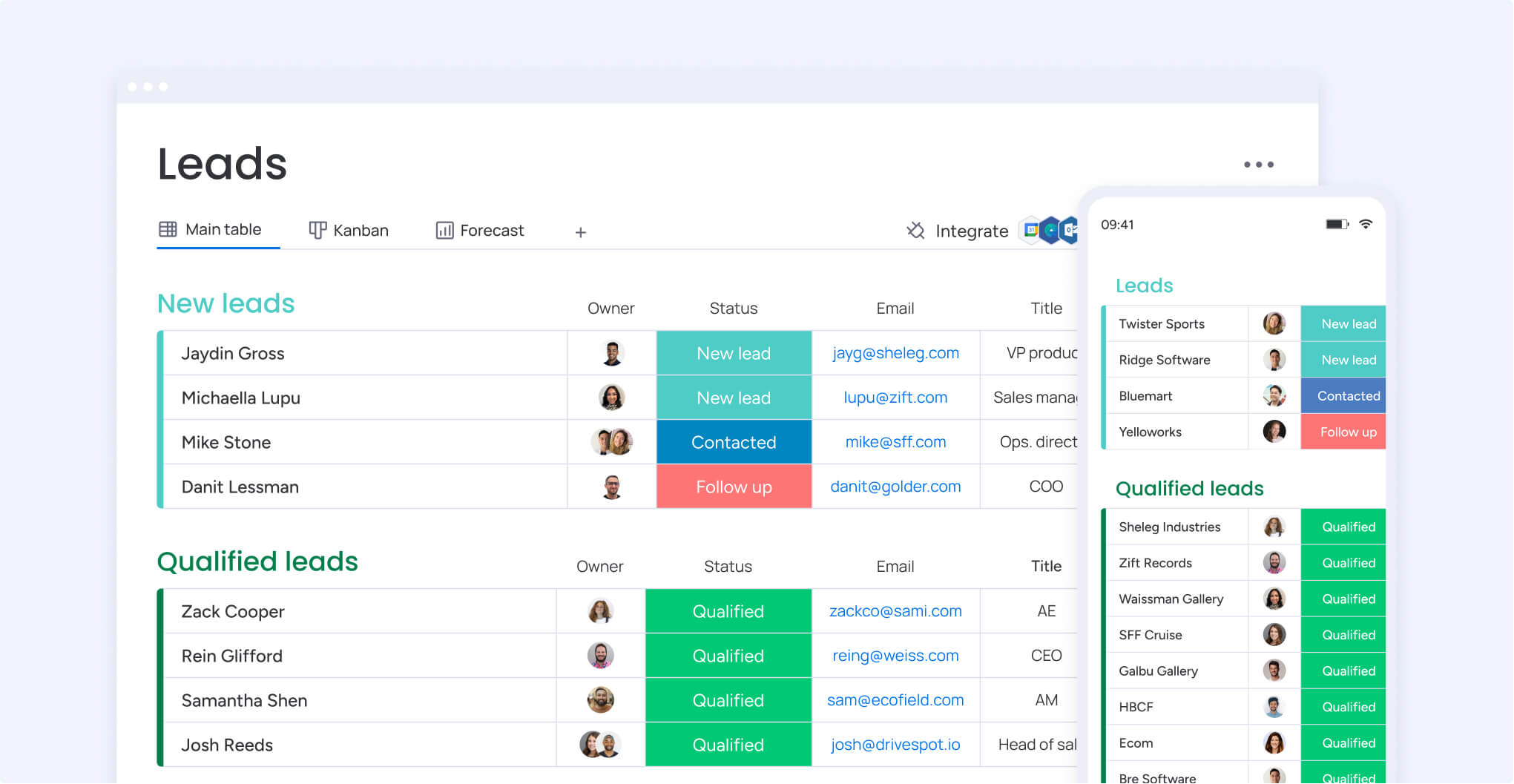
Built on the monday Work OS, monday CRM helps teams approach sales enablement by using AI to power content organization and pipeline management. Sales materials like pitch decks, case studies, and email templates live in one centralized location with clear visual indicators for deal progress. The platform’s advanced CRM automation features handle repetitive tasks in the background, freeing up valuable selling time.
Key features
- AI assistant (monday sidekick) for suggesting next steps and helping reps create personalized content
- AI-powered analytics to show team and individual performance for targeted coaching
- Generative AI for creating and storing tailored content like email templates and pitches in one place
Pricing
- Plans starting from $12/seat/month
- Free 14-day trial
Learn more about monday CRM plans and pricing.
What users are saying
G2 rating: 4.6/5
“We use it in every aspect of our company now. It is so useful for managing, organizing, and keeping track of our customers. We are able to see every step of their journey with us due to the monday CRM. We are slowly transitioning our whole company to use the CRM and we have already seen the benefits and heard such positive comments from our team.” — Emily W.
Try monday CRM2. Salesforce Sales Cloud
Use case: Enterprise sales enablement with AI-powered insights
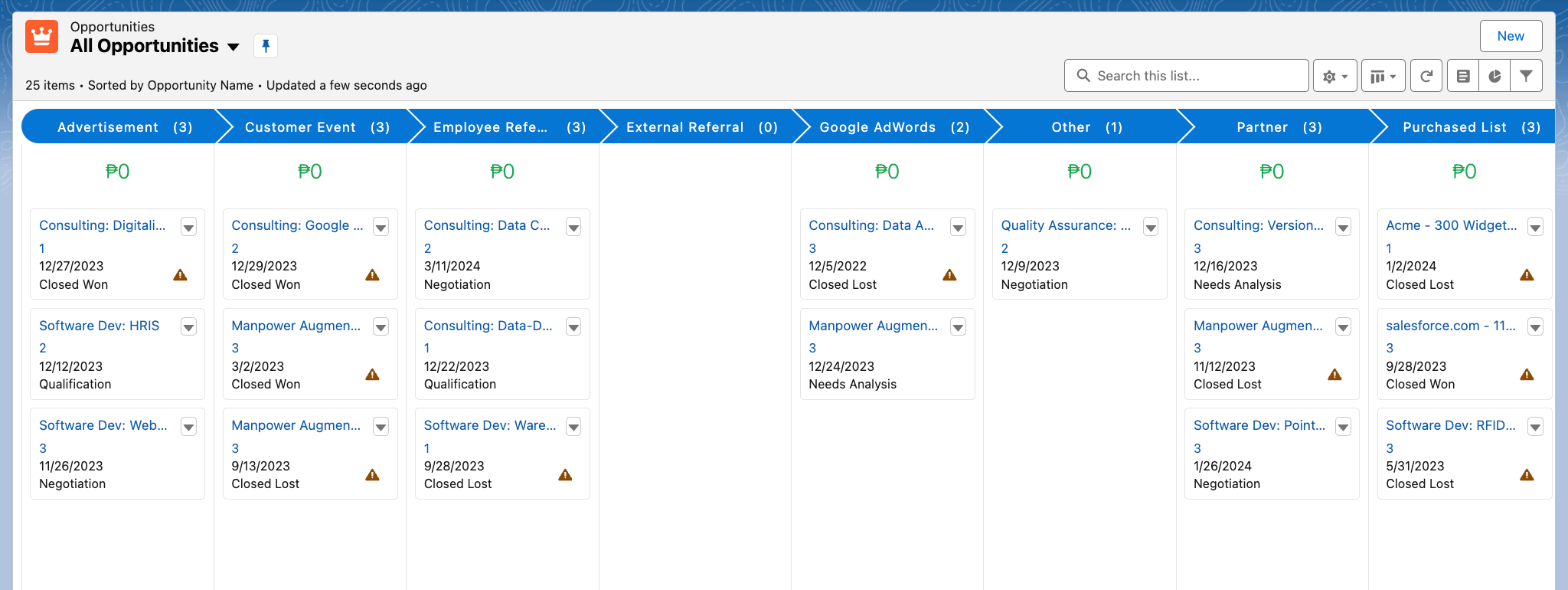
Salesforce Sales Cloud is a comprehensive solution that combines content management, training capabilities, and advanced analytics in a single platform. Teams can gain access to centralized training modules and coaching tools, while managers can dive into conversation analytics to identify coaching opportunities. Users can access extensive integration capabilities through its Salesforce AppExchange so that all the tools in your sales stack work together harmoniously.
Key features
- Einstein AI assistant for real-time deal recommendations and workflow automation
- Conversation insights to track keywords in sales interactions and improve rep performance
- Advanced analytics dashboards for forecasting and pipeline visibility
Pricing details
- Plans starting from $25/user/month
- Free 30-day trial
What users are saying
G2 score: 4.4/5
“What I love best about Salesforce Sales Cloud is that I can build GTM Enablement programs in the place where my organization’s Salesforce spends all of their time – Salesforce! I also love that I can tie enablement directly to business goals already tracked and reported on in the platform.” — Karen T.
3. HubSpot Sales Hub
Use case: Integrated sales enablement with marketing alignment
HubSpot Sales Hub makes content management simple with built-in templates, centralized resource libraries, and automated tracking that shows which materials drive results. The platform uses AI to improve pipeline management and help agents close more deals. HubSpot Sales Hub is one of the few solutions to offer a free tier with basic sales features, enabling growing teams to access essential enablement features and then scale as needs evolve.
Key features
- Sales playbooks for standardizing processes and equipping teams with proven scripts
- Conversation intelligence to help managers identify coaching opportunities and performance gaps
- Sales content analytics for highlighting which templates and sequences drive the best results
Pricing
- Free Forever plan
- Plans starting from $15/month/seat
What users are saying
G2 rating: 4.4/5
“What I like best about HubSpot Sales Hub is its integration of CRM, sales enablement, and automation into one intuitive platform. The user interface is clean, the workflows are powerful yet easy to set up, and the integration with LinkedIn Sales Navigator, Surfe, and Engage AI creates real value in our outreach and follow-up. It supports both strategic alignment and daily execution across teams.” — Anders B.
4. Seismic
Use case: AI-driven content management and sales coaching
Seismic tackles the challenge of getting the right content to each prospect at exactly the right moment. AI algorithms analyze deal context, buyer behavior, and historical performance to recommend materials that move deals forward. The platform is flexible enough to fit a variety of teams, whether it’s customer-facing sales departments, marketing teams, or revenue teams.
Key features
- Aura AI assistant for creating personalized content and training materials
- AI-driven feedback insights to reveal performance gaps for targeted coaching and development
- AI-recommended content for tailoring messaging to each segment and sales scenario
Pricing
Custom pricing available upon request.
What users are saying
G2 rating: 4.7/5
“As a Sales Enablement Program Manager I really appreciate the access to data and insights that show me who is using what content and how. It makes it incredibly powerful to communicate with leadership across Sales and Marketing to show them what’s actually working and impacting the Sales funnel. I can also easily make requests of our content and business unit teams to create valuable assets knowing what is resonating with our users.” — Colin A.
5. Highspot
Use case: AI-powered GTM enablement
Highspot is a unified sales enablement platform that helps teams execute and optimize go-to-market processes to reach revenue targets. Through a combination of AI, analytics, training, and content management, Highspot guides teams through proven sales practices and helps sales teams better understand what works for prospects and clients.
Key features
- AI role play for practicing sales conversations with real-time feedback
- Interactive playbooks to guide sellers through proven sales processes
- Analytics dashboards for delivering insights into conversations and coaching opportunities
Pricing
Custom pricing available upon request.
What users are saying
G2 rating: 4.7/5
“Highspot is a great platform with multiple functions. We use it for learning and coaching for our onboarding of new hires and also for coaching existing teams through content. Sellers can pitch directly from Highspot and gather analytics on views and downloads by their prospects and this data is automatically recorded in Salesforce. Content can be easily displayed and bookmarked for reference too.” — Clare B.
6. Showpad
Use case: AI enablement for sales and marketing teams
Showpad combines content and training to help sales and marketing teams engage prospects and customers. The solution centralizes sales content and tools in one place, making it easier for agents to access the most relevant content that converts. Showpad also provides a space for onboarding, training, and AI-powered coaching based on the successful behaviors of a team’s top sellers.
Key features
- Content optimization tools for improving asset management based on engagement data
- Analytics and insights to surface performance metrics with AI-driven feedback
- Showpad Video for recording and sharing personalized videos with prospects
Pricing
Custom pricing available upon request.
What users are saying
G2 rating: 4.6/5
“Showpad brings unified content management and integration with our Salesforce CRM home in a way that other platforms don’t. It’s helped us create a professional sales enablement tool for our team when speaking to prospects that syncs with all of their activity in both Salesforce and Outlook, making adoption easy on them and version control easy on us. ” — Kyle A.
Get the full list of recommended sales enablement tools for 2026
How to choose the right sales enablement software
Choosing sales enablement software isn’t just about picking the tool with the longest feature list. The right solution depends on your team size, sales model, and budget. Here’s how to evaluate your options:
- Startups and small businesses: Look for affordability, ease of setup, and scalability. A free plan or low per-seat cost (like HubSpot or monday CRM) helps you get started quickly without over-investing.
- B2B and enterprise teams: Prioritize advanced analytics, conversation intelligence, and integrations with existing systems like Salesforce or Outlook. Features such as AI-driven coaching and forecasting are critical for scaling complex sales motions.
- Field sales teams: Mobile-friendly access and offline capabilities are essential. Choose a tool that integrates seamlessly with calendars, messaging, and CRM systems so reps can update deals and access resources on the go.
By aligning your choice with your team’s structure and sales strategy, you’ll find a platform that drives real adoption and measurable results.
Simplify sales enablement with monday CRM
When it comes to sales enablement, the secret is not to overcomplicate things with too many tools and complex software implementations. Find a tool that’s user-friendly, intuitive, and can be customized to fit your business’s workflows. An AI-powered CRM like monday CRM offers plenty of sales enablement features alongside standard CRM capabilities and advanced artificial intelligence to give you a comprehensive sales suite.
With monday CRM, teams can easily collaborate in real time on sales content, such as email templates, contracts, and reports. It acts as a single source of truth for your organization’s sales and marketing teams by housing all your most important content, contacts, communications, and data. Thanks to the platform’s AI features to handle manual tasks behind the scenes, monday CRM empowers teams to accomplish more without relying on additional resources.
Teams that use monday CRM for sales enablement have reported a 61% increase in monthly revenue and 78% reached sales quotas, all thanks to the platform’s advanced enablement tools. Let’s take a more detailed look at some of monday CRM’s sales enablement features.
Put your sales pipeline on autopilot with AI
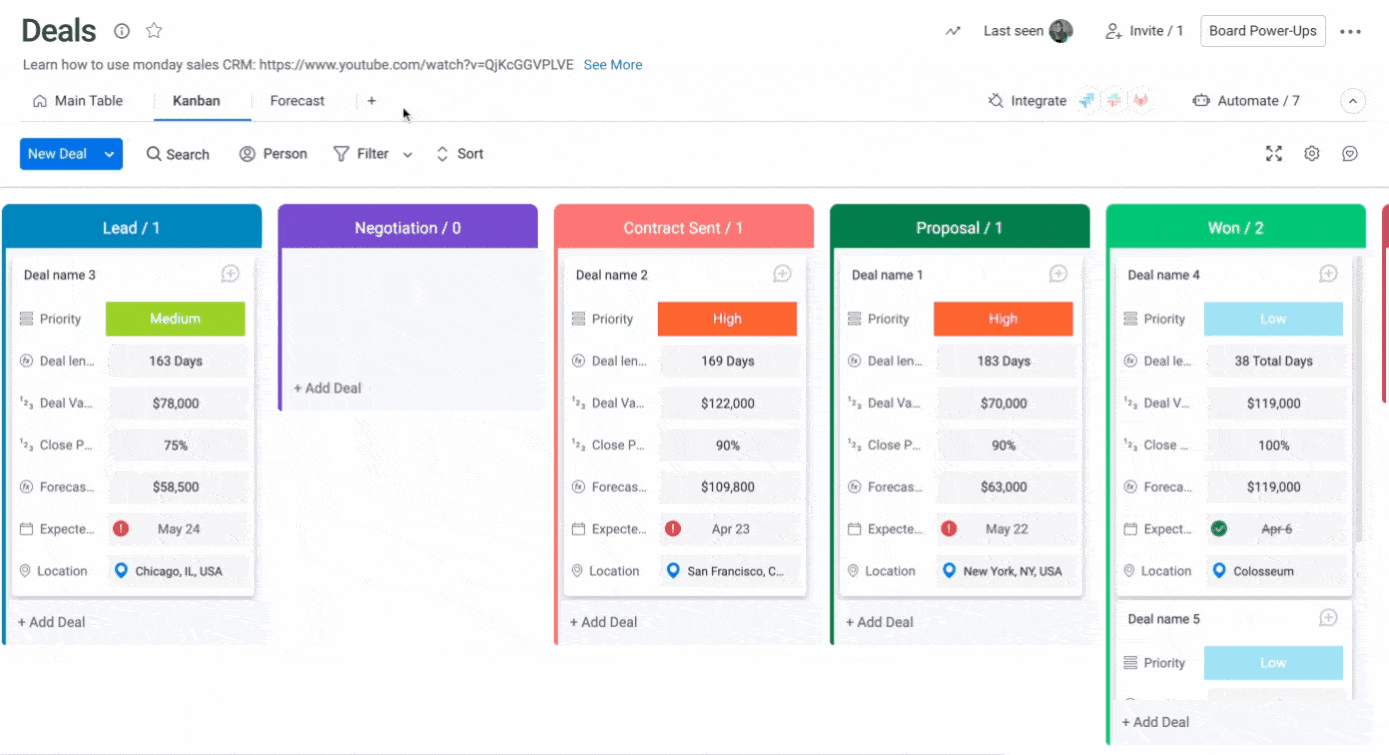
With monday CRM’s powerful AI automations, you can build your own custom formulas in minutes that will take care of your pipeline even while your entire team is asleep. Automate follow-ups, status updates, approvals, and extract data from forms and documents for smooth pipeline management.
Powerful AI workflows with data integration
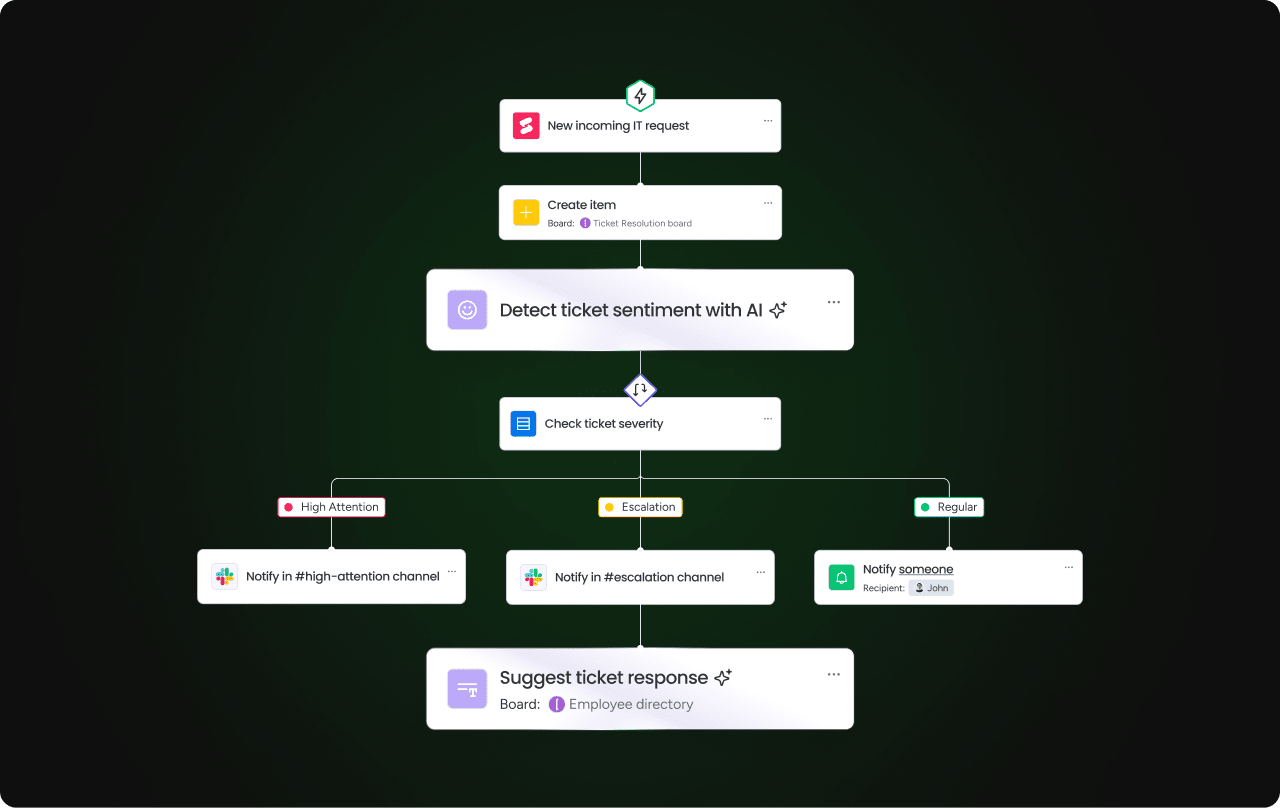
Create custom workflows powered by AI that can handle complex processes and even third-party integrations. Connect over 200 apps to monday CRM, and then integrate them into AI-led workflows, such as triggering a follow-up reminder when you get a reply to a sales pitch in Gmail or creating tasks based on Slack messages.
Onboarding, training, and coaching in one place
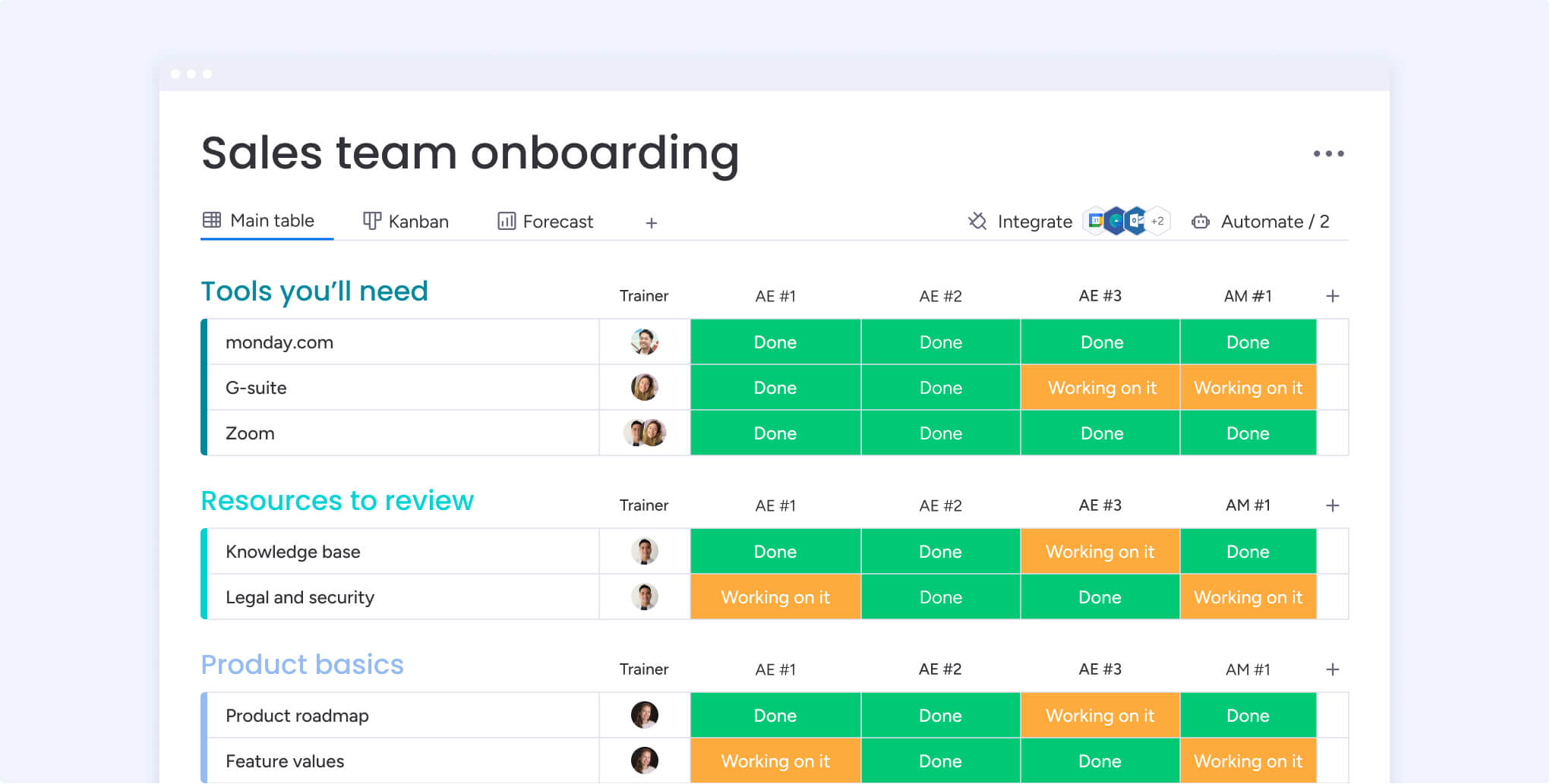
Whether you’re onboarding new employees or looking for a platform to handle ongoing training for your sales team, monday CRM can handle it all. Real-time predictive analytics and sales forecasting offer insights to help tailor coaching content, while document storage and organization make it simple for new hires to access training modules on demand.
AI writers and assistants for tailored content
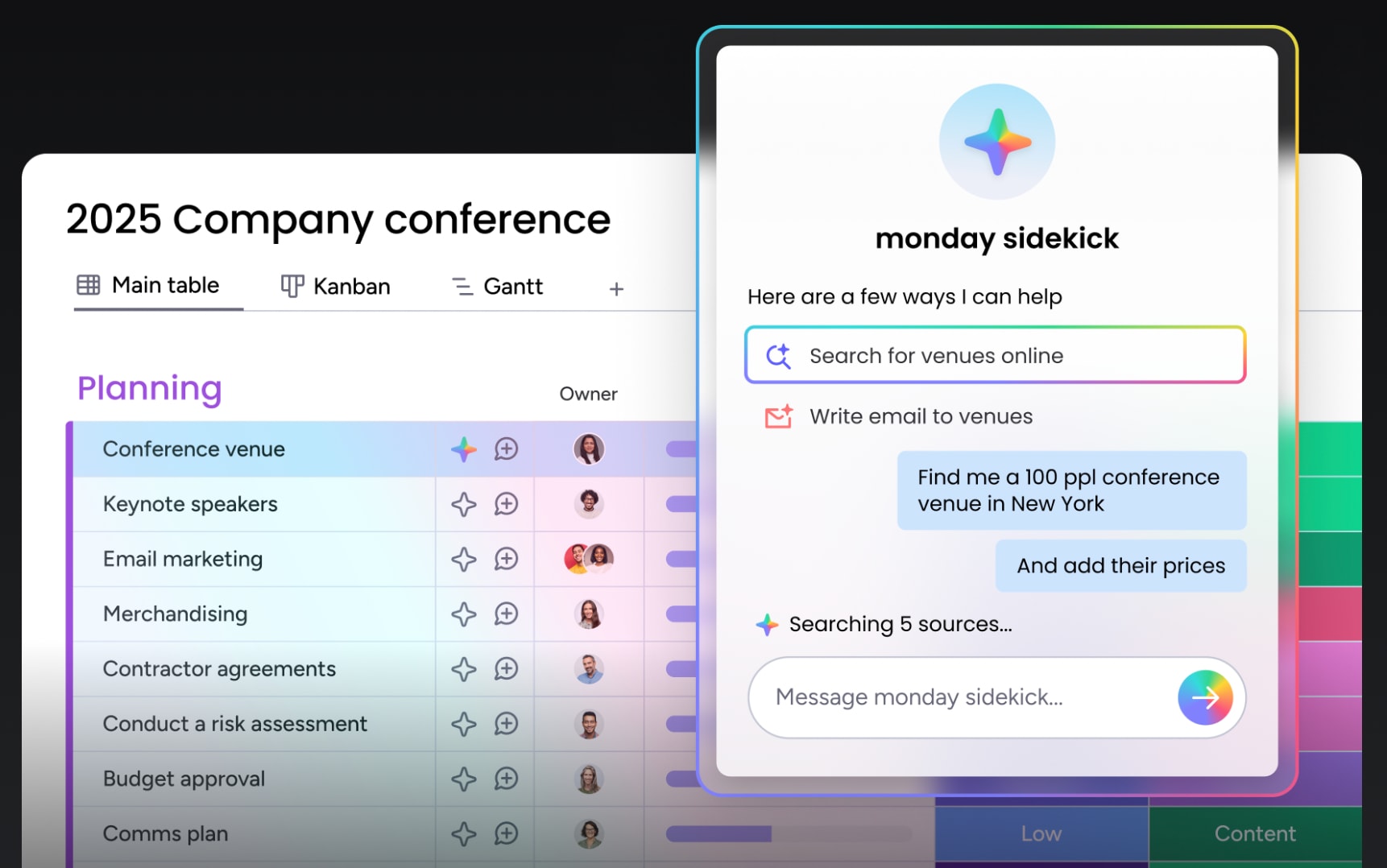
Featuring generative AI writers and an AI assistant, monday sidekick, monday CRM helps teams craft targeted content that resonates with prospects and clients. Marketing teams can use monday sidekick to create polished email campaigns based on engagement behavior, and sales teams can generate personalized emails that pull data from previous interactions.
Sales enablement trends to watch
Over the next few years, the sales enablement space will see even greater reliance on AI and automation. Here are a few trends shaping the future of the field:
- Deeper AI personalization: Tools will adapt to each rep’s style and buyer persona, surfacing content and strategies that resonate on a one-to-one level.
- Real-time conversational coaching: AI will provide in-call guidance and feedback, helping reps adjust tactics instantly rather than waiting for post-call reviews.
- Smarter integrations across the tech stack: Sales enablement won’t be siloed — it will connect seamlessly with CRM, marketing automation, and collaboration tools.
- Data-driven onboarding and training: New hires will ramp faster with personalized training paths built from analytics and best practices of top performers.
These trends point to a future where sales enablement platforms act less like static libraries and more like intelligent partners that adapt to your team’s needs.
Future-proof your strategy with AI-driven sales enablement
Implementing sales enablement doesn’t have to be complex. With an AI-backed solution like monday CRM, teams can centralize sales content, gain pipeline visibility, and access training resources — all in one place. The result: faster onboarding, more productive reps, and higher win rates.
Give your team a simple, powerful platform for sales enablement to stay ahead of the market and consistently outperform the competition.
Try monday CRMFAQs
What is the difference between sales enablement and sales automation?
Sales enablement is about giving reps the right content, training, and insights to sell smarter, while sales automation handles repetitive tasks like email follow-ups or data entry. Think of enablement as strategy and resources, and automation as the tech that takes busywork off your plate.
How can B2B companies use sales enablement tools to close more deals?
B2B teams can use sales enablement tools to keep content, playbooks, and training all in one place. These platforms help reps quickly find the right case study, deck, or email template for a prospect, while managers use analytics and coaching insights to strengthen pitches and close deals faster.
Are there free or low-cost sales enablement solutions available?
Yes! Tools like HubSpot Sales Hub offer free plans with basic enablement features, and monday CRM starts at a low per-seat price. Many platforms also include free trials, so you can test-drive features like AI content generation, coaching, and analytics before committing to a bigger investment.
Can a CRM be used for sales enablement?
Of course. A CRM isn’t just for tracking contacts. It can centralize sales content, automate workflows, and even provide AI insights. With platforms like monday CRM, reps get deal visibility, content management, and coaching insights in one place, turning the CRM into a powerful sales enablement hub.
How do you measure the ROI of sales enablement software?
To measure the ROI of sales enablement software, start by looking at specific metrics: shorter sales cycles, higher win rates, and improved rep productivity. Many platforms track content usage, deal progression, and coaching impact. If your team is closing more deals, ramping up faster, and spending less time on admin work, that’s clear ROI.
What features should a startup look for in sales enablement software?
Startups should focus on tools that are affordable, simple to implement, and scalable. Features like built-in templates, easy content sharing, and basic analytics help small teams get quick wins without over-complicating workflows.
What is an AI sales enablement engineer, and what do they do?
An AI sales enablement engineer is a specialist who designs and maintains AI-powered workflows within sales enablement software. They help configure automations, conversation intelligence, and predictive analytics so sales reps can focus on selling while the system handles repetitive tasks and surfaces insights.

